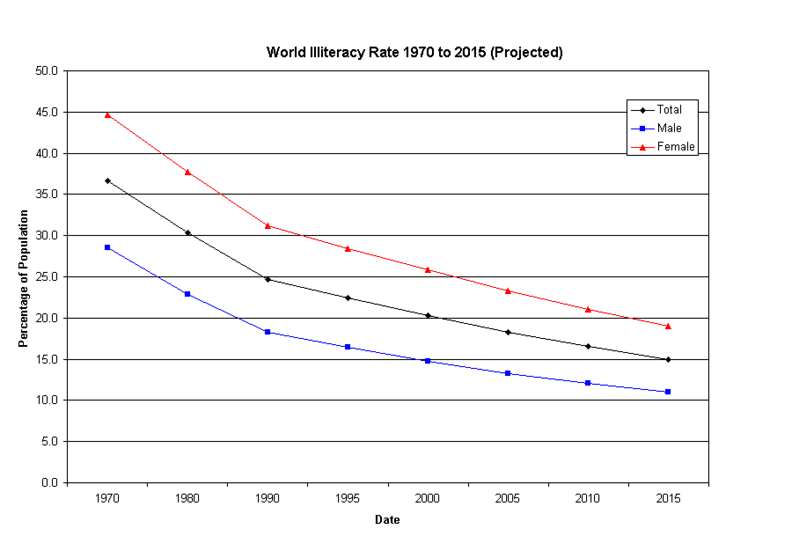Difference between revisions of "Literacy rates increase worldwide"
| Line 21: | Line 21: | ||
== Inhibitors == | == Inhibitors == | ||
- Developing countries don't invest enough or get enough help to teach people to read | |||
- Use of e-books in certain areas (access the Internet or get e-book readers) is too expensive | |||
== Paradigms == | == Paradigms == | ||
Revision as of 19:42, 5 March 2007
Description
Definition of literacy has changed over times. In a history, once a literate person was one, who could sign his or her name. Later on, literacy was measured by the ability to read the Bible. Nowadays The United Nations Educational, Scientific and Cultural Organization UNESCO has defined literacy :"Literacy is the ability to identify, understand, interpret, create, communicate and compute, using printed and written materials associated with varying contexts. Literacy involves a continuum of learning to enable an individual to achieve his or her goals, to develop his or her knowledge and potential, and to participate fully in the wider society." [1]
Illiteracy rate has been decreasing year by year, and on year 2015 illiteracy rate is estimated to be 15%. [1]
At the moment, the most developed areas are North America and Western Europe (minus Cyprus and Malta) and Australia, Japan, New Zealand.
Less developed regions include: Sub-Saharan Africa, Latin America and Caribbean, Eastern Asia and the Pacific (minus Australia, Japan and New Zealand), South and Western Asia, Arab States and North Africa, Cyprus, Malta, Mongolia, Turkey.
The illiteracy rates of different continents in different years can be found on Unesco's website:
http://www.uis.unesco.org/en/stats/statistics/UIS_Literacy_Regional2002.xls
Enablers
- better education
- developing countries are starting to give more effort on literature skills
- E-books can offer new opportunities to teach people to read
- E-books are easy to access in any locations
Inhibitors
- Developing countries don't invest enough or get enough help to teach people to read - Use of e-books in certain areas (access the Internet or get e-book readers) is too expensive
Paradigms
Experts
- The United Nations Educational, Scientific and Cultural Organization UNESCO
Timing
- 1980 world illiteracy rate was 30%
- 2000 world illiteracy rate around 20%
- 2015 world illiteracy rate is estimated to be 15%
Web Resources
[1] http://en.wikipedia.org/wiki/Literacy#World_literacy_rates
